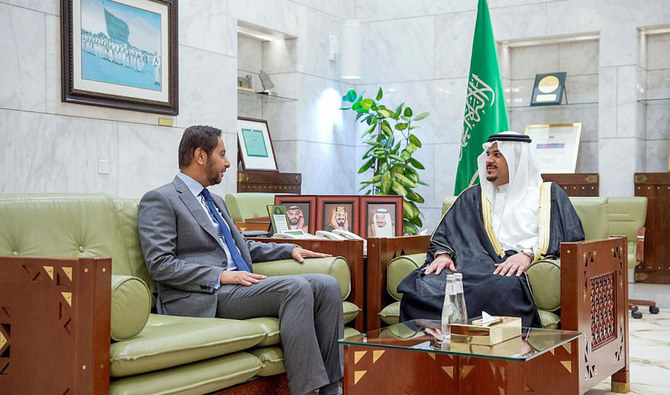RIYADH: Prince Mohammed bin Abdulrahman bin Abdulaziz, the deputy governor of Riyadh region, met Djibouti’s Ambassador to Saudi Arabia Dya-Eddine Said Bamakhrama on Tuesday to discuss areas of mutual interest.
The envoy, who is also dean of the diplomatic corps, told Arab News he was pleased to have had the opportunity to meet the prince and discuss matters with him and other senior officials.
“We had cordial conversations and exchanged ideas on a number of topics of common interest,” he said.
“I thanked Prince Mohammed, and Prince Faisal bin Bandar bin Abdulaziz, the governor of Riyadh region, and Prince Faisal bin Abdulaziz bin Ayyaf, the mayor of Riyadh, for all their cooperation and distinguished presence in honoring and interacting with diplomats and embassies accredited to the Kingdom at various programs.
“The discussions focused on various subjects, particularly the situation of Djiboutian nationals residing in the Riyadh region,” he added.
Bamakhrama also congratulated Prince Mohammed on the great achievements made by Riyadh and the Kingdom in general, and praised the NEOM Smart City project after Crown Prince Mohammed bin Salman on Monday announced plans for The Line development there.
“The Line, a smart city project, is beyond imagination in NEOM, Saudi Arabia. An important addition to King Salman’s accomplishments and the vision of Crown Prince Mohammed bin Salman. Such exceptional projects reassure the leading role of KSA under its wise leadership,” he said on Twitter.
His post was alongside a tweet by NEOM that said: “Presenting a 170 km vertical city that can be traveled end to end in 20 minutes. Giving residents a convenient lifestyle within 5-minute walk neighborhoods and communities organized in three dimensions, THE LINE is the future of urban living.”
The crown prince said on Monday that The Line would epitomize “ideal living” and address humanity’s urgent challenges.
“NEOM is one of the most important projects of Saudi Vision 2030, and The Line is an affirmation of our firm commitment to presenting a project to the whole world. NEOM is a place for those who dream of a better tomorrow,” he said.















